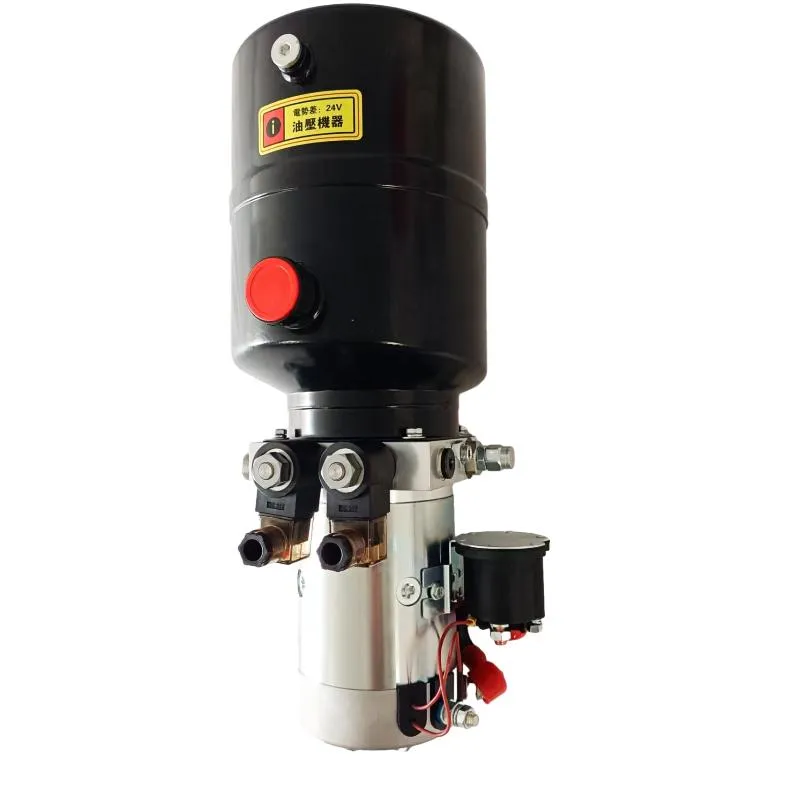Aug . 17, 2024 19:17 Back to list
Leading Manufacturers of Hydraulic Power Units for Reliable Industrial Applications
Understanding Hydraulic Power Unit Manufacturers
Hydraulic power units (HPUs) play a vital role in various industries, serving as the heartbeat of hydraulic systems that power machinery and equipment. From construction sites to manufacturing plants, HPUs are crucial for efficient operations. The importance of selecting a reliable hydraulic power unit manufacturer cannot be overstated, as the performance and longevity of hydraulic systems largely depend on the quality of these units.
What is a Hydraulic Power Unit?
A hydraulic power unit is a system that generates and controls hydraulic pressure. It typically consists of a hydraulic pump, reservoir, motor, valves, and other related components housed in a single unit. The primary function of an HPU is to convert mechanical energy into hydraulic energy, which is then transmitted to hydraulic actuators, such as cylinders or motors, to perform work. These units are widely used in various applications, including construction equipment, industrial machinery, and mobile equipment.
The Role of Manufacturers
Choosing the right hydraulic power unit manufacturer is essential for several reasons
1. Quality and Reliability A reputable manufacturer adheres to industry standards and ensures that their products undergo rigorous testing. This is crucial for maintaining operational efficiency and minimizing downtime due to equipment failure. High-quality HPUs tend to have a longer lifespan, which translates to cost savings in the long run.
2. Custom Solutions Every application has unique requirements. Leading manufacturers offer customized solutions tailored to specific needs, including flow rate, pressure, and size. This flexibility allows industries to optimize their hydraulic systems for better performance and productivity.
3. Technical Support and Service A strong manufacturer not only provides quality products but also offers comprehensive technical support. This includes assistance with installation, troubleshooting, and maintenance. Having access to knowledgeable technicians can significantly reduce downtime and ensure that systems are running at their optimal levels.
4. Innovation and Technology The hydraulic industry is continuously evolving, with advancements in technology that improve efficiency and performance. Manufacturers that invest in research and development are better equipped to provide innovative solutions, such as energy-efficient HPUs and smart systems that enhance control and monitoring.
hydraulic power unit manufacturer

5. Compliance and Safety Hydraulic systems operate under high pressure, making safety a paramount concern. A reputable HPU manufacturer complies with safety standards and regulations, ensuring that their products minimize risks associated with hydraulic failures. This commitment to safety is crucial in protecting both personnel and equipment.
Choosing the Right Manufacturer
When selecting a hydraulic power unit manufacturer, consider the following factors
- Experience and Reputation Look for manufacturers with a solid track record and positive reviews from customers. Industry experience can be an indicator of reliability and expertise.
- Product Range A wide variety of products indicates that a manufacturer can cater to different applications and requirements.
- Certifications Manufacturers that possess industry certifications demonstrate their commitment to quality and safety standards.
- After-Sales Support Evaluate the level of customer service and support offered post-purchase. This can greatly influence your experience with the equipment.
- Price vs. Value While cost is an essential factor, it should not be the sole criterion. Assess the value provided by the manufacturer in terms of quality, support, and warranty options.
Conclusion
In conclusion, hydraulic power unit manufacturers are fundamental to the functionality and efficiency of hydraulic systems across various industries. Investing in a high-quality HPU from a reputable manufacturer can lead to enhanced performance, safety, and cost savings. Businesses must carefully evaluate their options and select a manufacturer that aligns with their specific needs and operational goals. By doing so, they can ensure the reliability and efficiency of their hydraulic systems for years to come.
-
Fork Lift Power Units - Hebei Shenghan | Efficiency, Reliability
NewsJul.13,2025
-
1.5-Ton Turbocharged Cylinder-Hebei Shenghan|Hydraulic Solution,Energy Efficiency
NewsJul.13,2025
-
Auto Hoist Power Units-Hebei Shenghan|Efficiency&Industrial Lifting
NewsJul.13,2025
-
Double Acting Power Units-Hebei Shenghan|Hydraulic Solutions,Industrial Efficiency
NewsJul.13,2025
-
1.5 Ton Lifting Cylinder 70/82-40-290-535 - High-Performance Hydraulic Solution | Hebei Shenghan
NewsJul.13,2025
-
Fork Lift Power Units - Hebei Shenghan | Efficiency&Reliability
NewsJul.13,2025
